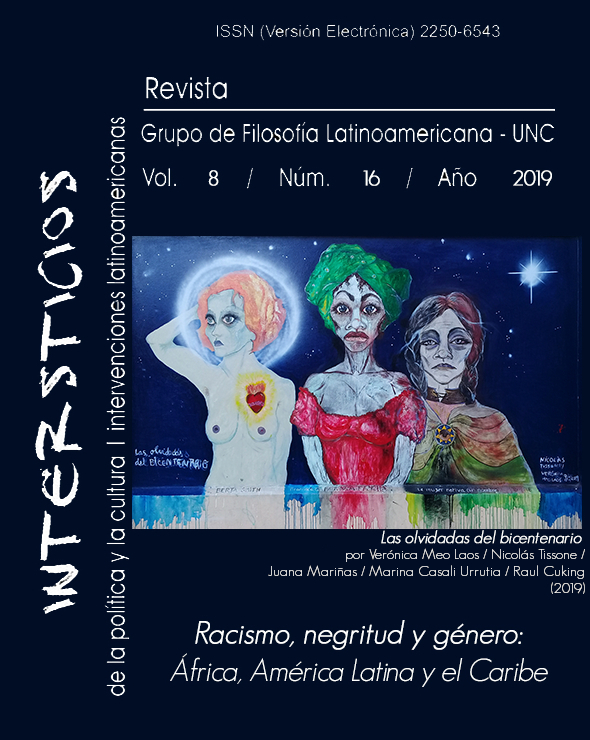An analytics of power from the global south: Achille Mbembe's contributions to a situated genealogy of racism.
Keywords:
necropolitics, global south, resistancesAbstract
Abstract: This article is based on the following questions: what power strategies are implemented in the current phase of capitalism in pursuit of the "management" of bodies? Do these strategies assume peculiar characteristics in peripheralised geopolitical contexts? Is it possible that in such spaces the key to peculiarity is found in the conjunction between the notions of power, life-death, and race?
As a first hypothesis, we will argue that this thinker's contributions to critical theory constitute an unavoidable reading key for analyzing the modes of functioning of power over bodies in the contemporary Global South. This is because -we consider- its notion of "necropolitics" allows us to think genealogically not only the forms that the "processes of racialization" took in their emergency (colonial) context, but also the modalities that racism assumes within the current capitalist phase.
Our first objective, then, is to detect - through a brief review of its central texts - both the recurrences and the existing discontinuities between the strategies of construction of "subjects of race" deployed in the period of "modern colonial occupation", and in the "late colonial occupation". A second objective is to answer the question of what bodies have become, today, privileged objects of the "new devices" of identification, classification and racial segregation.
Finally, we will present some of Mbembe's reflections -as well as his relations with the proposals of other thinkers- regarding the practices of resistance and "re-existence" that allow us to rethink politics in the present, in the face of these modes of organization and management of life.
Downloads
References
Albán Achinte, A. (2012). Epistemes ‘otras’: ¿Epistemes disruptivas? En Revista Kula. Antropólogos del Atlántico SurNº 6,Buenos Aires. Recuperado de https://docplayer.es/284409-Epistemes-otras-epistemes-disruptivas-1.html
Albán Achinte, A. (2018). Prácticas creativas de re-existencia. Más allá del arte… el mundo de lo sensible. Buenos Aires: Del signo.
Borsani, M. E. (2016). Sobrantes, excedentes. En Otros logos, Revista de estudios críticos del Centro de Estudios y Actualización en Pensamiento Político, Decolonialidad e Interculturalidad N°7, Neuquén, 2016. Recuperado de http://www.ceapedi.com.ar/otroslogos/Revistas/0007/2%20editorial.pdf
Butler, J. (2006). Vida precaria. El poder del duelo y la violencia. Buenos Aires: Paidós.
Butler, J.; ATHANASIU, A. (2017). Desposesión: lo performativo en lo político. Buenos Aires: Eterna Cadencia.
Castro-Gómez, S.; Chukwudi Eze, E.; Paget, H. (2014). El color de la razón. Racismo epistemológico y razón imperial. Buenos Aires: Ediciones del signo.
Comité invisible (2007). La insurrección que viene. París: La fabrique editions.
Escobar, A. (2007). La invención del Tercer Mundo Construcción y deconstrucción del desarrollo. Caracas: Fundación Editorial El perro y la rana.
Escobar, A. (2017). Autonomía y diseño: la realización de lo comunal. Buenos Aires: Tinta Limón.
Federici, S. (2013). Revolución en punto cero. Trabajo doméstico, reproducción y luchas feministas. Madrid: Edición Traficantes de Sueños.
Foucault, M. (2007). Nacimiento de la biopolítica. Curso en el Collège de France (1978-1979).Buenos Aires: FCE.
Gerbi, A. (1960). La disputa del nuevo mundo. Historia de una polémica, 1750-1900. Madrid: Fondo de Cultura Económica.
Guattari, F. (2004). Plan sobre el planeta. Capitalismo mundial integrado y
revoluciones moleculares. Madrid: Traficantes de sueños.
Mbembe, A. (2006). “Necropolítique”, enTraversées, diásporas, modernités, RaisonspolitiquesN° 21, París, 2006. Recuperado de: https://www.melusina.com/rcs_gene/Necropol_tica.pdf
Mbembe, A. (2013). Sortir de la grande nuit. Essai sur l’AfriqueDecolonisée, Paris: La Découverte
Mbembe, A. (2016a). Crítica de la razón negra. Buenos Aires: Futuro Anterior.
Mbembe, A. (2016b). “Cuando el poder brutaliza el cuerpo, la resistencia asume una forma visceral”. En Futuro Anterior (ed.), Buenos Aires, 2016. Recuperado de: http://www.futuroanterior.com.ar/blog/cuando-el-poder-brutaliza-el-cuerpo-la-resistencia-asume-una-forma-visceral
Mbembe, A. (2019).“Bodies as Borders & Technologies of Race”.Conferencia impartida en la UNAM, México. Recuperado de:
Mignolo, W. (2003). Historias locales / Diseños globales. Madrid: Akal.
Quijano, A. (2000). Colonialidad del poder, eurocentrismo y América Latina. En Edgardo Lander (comp.).La colonialidad del saber: eurocentrismo y ciencias sociales. Perspectivas Latinoamericanas. Buenos Aires: Consejo Latinoamericano de Ciencias Sociales.
Sousa Santos, B. (2010). Descolonizar el saber, reinventar el poder. Montevideo: Ediciones Trilce.
Sousa Santos, B. (2014). Epistemologías del Sur. Madrid: Akal.
Sagot, M. (2017). ¿Un mundo sin femicidios? las propuestas del feminismo para erradicar la violencia contra las mujeres. En Montserrat Sagot (coord.). Feminismos, pensamiento crítico y propuestas alternativas en América latina. Buenos Aires: CLACSO.
Downloads
Published
Issue
Section
License
Authors who have publications with this journal agree to the following terms:
a. Authors will retain their copyright and grant the journal the right of first publication of their work, which will simultaneously be subject to the Creative Commons Attribution License that allows third parties to share the work as long as its author and first publication in this journal are indicated.
b. Authors may adopt other non-exclusive license agreements for distribution of the published version of the work (e.g., deposit it in an institutional telematic archive or publish it in a monographic volume) as long as the initial publication in this journal is indicated.
c. Authors are allowed and encouraged to disseminate their work through the Internet (e.g., in institutional telematic archives or on their web page) after the publication process, which may produce interesting exchanges and increase citations of the published work (see The effect of open access).


